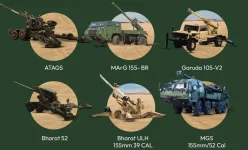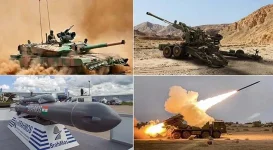- Views: 4K
- Replies: 16
Amid escalating tensions and the looming threat of a full-scale conflict with Pakistan, India's Ministry of Defence is reportedly considering a temporary halt on the export of 155mm artillery shells. Sources indicate this potential measure aims to ensure the Indian Army's preparedness by prioritising national requirements.
The consideration follows a reported surge in hostilities, including terrorist attack in Pahalgam by Pakistan on April 22, 2025, that resulted in tourist fatalities, and other subsequent actions that have reportedly led to the suspension of the 2021 Line of Control (LoC) ceasefire and the deployment of advanced jamming technology along the border.
Indian defence manufacturers, including both private companies and state-owned enterprises, have significantly increased their production and overseas sales of 155mm artillery ammunition to countries in Europe and the Middle East.
However, the Ministry of Defence is now reportedly re-evaluating this export-focused approach. The current review underscores the critical need to balance India's growing defence export goals with the overriding priority of meeting the Indian Army's potential needs in a wartime scenario.
India has become a prominent supplier in the international market for artillery ammunition, reportedly holding one of the top global positions in production capability, following nations like Russia and China.
Key Indian manufacturers such as the state-run Munitions India Limited (MIL) and Yantra India Limited (YIL), alongside private sector companies like Bharat Forge, have expanded operations to address a significant rise in international orders. This demand has been particularly strong since the conflict in Ukraine began in early 2022, creating a worldwide need for such munitions.
For instance, MIL reportedly secured a substantial contract with Saudi Arabia in February 2024, valued at $225 million. YIL is also said to have orders for 155mm shells that will keep its production lines busy until 2026-27, with revenue projections for the current fiscal year reportedly around Rs3,900 crore.
Significant exports have also been made to the United Arab Emirates, Armenia, and an unidentified European nation, with the UAE alone having received a large consignment between 2017 and 2019.
Currently, the Indian Army is understood to possess an adequate stock of 155mm artillery shells, supported by a strong domestic production capability. The private industry, for example, is anticipated to manufacture over 300,000 shells each year by the 2027 fiscal year.
Lieutenant General Adosh Kumar, the Director General of Artillery, recently emphasized the military's focus on developing indigenous ammunition to supply its varied range of 155mm artillery platforms, such as the Dhanush, K9 Vajra-T, and the DRDO's Advanced Towed Artillery Gun System (ATAGS).
However, the strategic outlook could change dramatically in the event of an all-out war with Pakistan. In such a conflict, military planners estimate the Army might need as many as 150,000 shells every month.
This monthly requirement represents half of the total projected annual production from the private sector. A conflict lasting a year could therefore consume over 1.5 million shells, a figure four times greater than current yearly output, potentially depleting reserves if exports are not curtailed.
Some defence industry analysts and stakeholders express concern that a complete ban on exports could negatively impact India's rapidly growing defence export industry. This sector reportedly achieved record export revenues of Rs21,083 crore in the fiscal year 2023-24 and has set a goal of reaching Rs50,000 crore by 2028-29.
State-owned enterprises such as YIL and MIL have made substantial investments to upgrade their manufacturing facilities; MIL's budget, for instance, was reportedly increased to Rs745.45 crore for the fiscal year 2025 to boost its production capabilities.
An export prohibition could jeopardise established markets in the Middle East and Europe, where Indian artillery shells are reportedly well-regarded for meeting NATO standards and for their reliability, including low failure rates.
Furthermore, private companies like Bharat Forge, which has also been involved in exporting artillery systems, contend that international sales foster innovation and create larger production volumes, which in turn benefit the efficiency and cost-effectiveness of manufacturing for India's own military.
Conversely, the Ministry of Defence's cautious stance is reportedly based on practical strategic considerations. Concerns exist that in a sustained conflict, the Indian Army could face ammunition shortages, particularly considering Pakistan's military capabilities, which include systems sourced from China and the potential involvement of foreign private military contractors.
The Ministry of Defence has previously emphasized self-reliance by banning the import of numerous defence items, including certain types of artillery ammunition, to encourage domestic manufacturing. However, the current debate over shell exports poses a challenge to this policy.
If domestic production cannot be increased quickly enough to meet wartime needs – a potential issue highlighted by reported delays in other ammunition programs, such as certain missile systems – an export ban might become a necessary measure to protect the nation's security interests.



